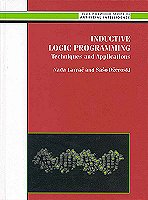
|
FreeComputerBooks.com
Links to Free Computer, Mathematics, Technical Books all over the World
|
|
- Title: Inductive Logic Programming: Techniques and Applications
- Author(s) Nada Lavrac and Saso Dzeroski
- Publisher: Ellis Horwood, New York, 1994
- Hardcover/Paperback: 400 pages
- eBook: PDF
- Language: English
- ISBN-10: 0134578708
- ISBN-13: 978-0134578705
- Share This:

|
This book is an introduction to inductive logic programming (ILP), a research field at the intersection of machine learning and Logic Programming, which aims at a formal framework as well as practical algorithms for inductively learning relational descriptions in the form of logic programs.
The book extensively covers empirical inductive logic programming, one of the two major subfields of ILP, which has already shown its application potential in the following areas: knowledge acquisition, inductive program synthesis, inductive data engineering, and knowledge discovery in databases.
The book provides the reader with an in-depth understanding of empirical ILP techniques and applications. It is divided into four parts. Part I is an introduction to the field of ILP. Part II describes in detail empirical ILP techniques and systems. Part III presents the techniques of handling imperfect data in ILP, whereas Part IV gives an overview of empirical ILP applications.
About the AuthorsN/A
- Artificial Intelligence and Logic Programming
- Machine Learning

- Mathematical Logic - Set Theory, Model Theory, Proof Theory, Computability, etc.
- Prolog Programming
- LISP and Common LISP Programming
- Inductive Logic Programming: Techniques and Applications (Nada Lavrac, et al.)
- The Mirror Site (1) - PDF
- The Mirror Site (2) - PDF
- The Mirror Site (2) - PDF
- Inductive Logic Programming at 30: a New Introduction (Andrew Cropper, et al)
-
 Simply Logical: Intelligent Reasoning by Example (Peter Flach)
Simply Logical: Intelligent Reasoning by Example (Peter Flach)
This book is an introduction to Prolog programming for artificial intelligence covering both basic and advanced AI material. A unique advantage to this work is the combination of AI, Prolog and Logic.
-
 Mathematical Aspects of Logic Programming Semantics
Mathematical Aspects of Logic Programming Semantics
This book discusses applications of Logic Programming to computational logic and potential applications to the integration of models of computation, knowledge representation and reasoning, and the Semantic Web.
-
 Logic Programming in Scheme (Nils M. Holm)
Logic Programming in Scheme (Nils M. Holm)
Questions answered in this little book: What is logic programming? Why is negation hard in logic programming? What is cutting? How do I solve logic puzzles? How is logic programming implemented?
-
 The Haskell Road to Logic, Maths and Programming (Kees Doets)
The Haskell Road to Logic, Maths and Programming (Kees Doets)
The purpose of this book is to teach logic and mathematical reasoning in practice, and to connect logical reasoning with computer programming. Haskell is based on a logical theory of computable functions called the lambda calculus.
-
 Logic, Programming and Prolog, 2nd Edition (Ulf Nilsson, et al)
Logic, Programming and Prolog, 2nd Edition (Ulf Nilsson, et al)
This book introduces major new developments in a continually evolving field and includes such topics as concurrency and equational and constraint logic programming.
-
 An Introduction to Logic Programming Through Prolog (J. Spivey)
An Introduction to Logic Programming Through Prolog (J. Spivey)
This is one of the few texts that combines three essential theses in the study of logic programming: logic, programming, and implementation. The techniques are illustrated by practical examples to explain how logic programming can be implented efficiently.





